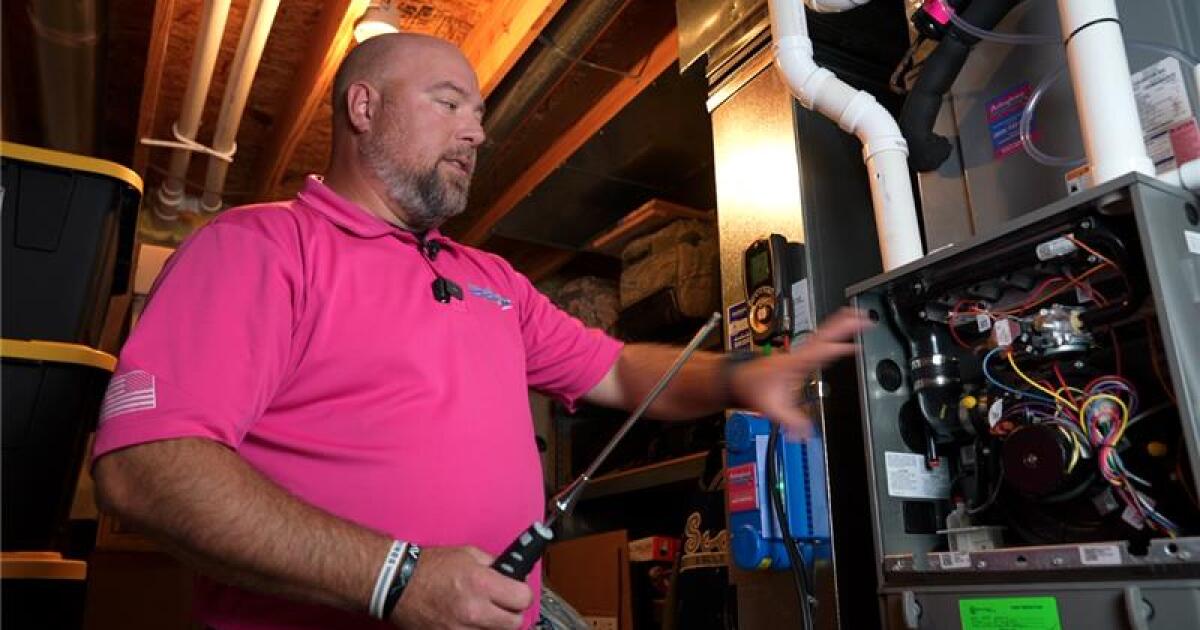Business
Heating Bills Expected to Rise This Winter: Tips to Save

Heating bills for millions of households are projected to rise significantly this winter, with average costs expected to reach nearly $1,000, according to the National Energy Assistance Directors Association. This increase represents an estimated 8% rise compared to the previous year, with homes using electricity facing even higher expenses, averaging around $1,205.
Ways to Mitigate Rising Heating Costs
Despite the looming increase in heating expenses, there are effective strategies homeowners can employ to reduce their bills while maintaining comfort. One critical recommendation comes from Nick Glace of Arlinghaus Plumbing & HVAC, who emphasizes the importance of regular maintenance for heating systems. He advises homeowners to budget around $200 annually for maintenance, which can prevent costly repairs or replacements in the long run.
Regular maintenance includes changing air filters, ideally every three months, at a cost of $20 or less. An annual tune-up for the furnace, typically ranging from $75 to $100, is also recommended. “We check gas flow to ensure optimal heat delivery into the heat exchanger,” Glace explained. Additionally, technicians inspect vents and registers to confirm they are unobstructed, enhancing heating efficiency.
Additional Strategies for Savings
Besides maintenance, addressing potential drafts is crucial. Mark Huffman, an expert from ConsumerAffairs, suggests sealing doors and windows with caulk and weatherstripping. “Older door frames can separate over time, allowing cold air to enter,” he noted. An energy audit, offered by utilities or private energy companies, can help identify areas that need attention.
Another effective way to manage heating costs is by installing a programmable or smart thermostat, usually priced at less than $100. “Why keep the house heated at the same level when you are asleep or at work?” Huffman posed. Homes equipped with an ENERGY STAR smart thermostat can save approximately 8% on heating and cooling bills, translating to around $50 annually, depending on personal preferences and HVAC systems.
Homeowners are encouraged to inquire with their utility providers about budget-friendly programs, such as “budget billing” or “even billing.” These options allow for manageable monthly payments based on estimated average costs throughout the year, helping families avoid unexpectedly high bills during peak winter months.
When it becomes necessary to replace an old furnace, upgrading to an energy-efficient model can lead to long-term savings on utility bills. Jacob Reyes, a customer of Arlinghaus, shared his experience with his previous furnace, describing it as an energy hog. With a new furnace and thermostat, he is optimistic about lower bills and improved energy efficiency.
As the winter approaches, implementing these strategies may help homeowners navigate the financial challenges posed by rising heating costs, ensuring comfort without excessive expenditures.
This article was reported by a journalist and has been converted for this platform with editorial review for fairness and accuracy.
“Don’t Waste Your Money” is a registered trademark of Scripps Media, Inc. For more consumer news and money-saving advice, visit www.dontwasteyourmoney.com.
-

 Lifestyle5 months ago
Lifestyle5 months agoLibraries Challenge Rising E-Book Costs Amid Growing Demand
-

 Sports4 months ago
Sports4 months agoTyreek Hill Responds to Tua Tagovailoa’s Comments on Team Dynamics
-

 Sports4 months ago
Sports4 months agoLiverpool Secures Agreement to Sign Young Striker Will Wright
-

 Lifestyle4 months ago
Lifestyle4 months agoSave Your Split Tomatoes: Expert Tips for Gardeners
-

 Lifestyle4 months ago
Lifestyle4 months agoPrincess Beatrice’s Daughter Athena Joins Siblings at London Parade
-

 Science4 months ago
Science4 months agoSan Francisco Hosts Unique Contest to Identify “Performative Males”
-

 World4 months ago
World4 months agoWinter Storms Lash New South Wales with Snow, Flood Risks
-

 Science5 months ago
Science5 months agoTrump Administration Moves to Repeal Key Climate Regulation
-

 Business5 months ago
Business5 months agoSoFi Technologies Shares Slip 2% Following Insider Stock Sale
-

 Science5 months ago
Science5 months agoNew Tool Reveals Link Between Horse Coat Condition and Parasites
-

 Sports4 months ago
Sports4 months agoElon Musk Sculpture Travels From Utah to Yosemite National Park
-

 Science5 months ago
Science5 months agoNew Study Confirms Humans Transported Stonehenge Bluestones









